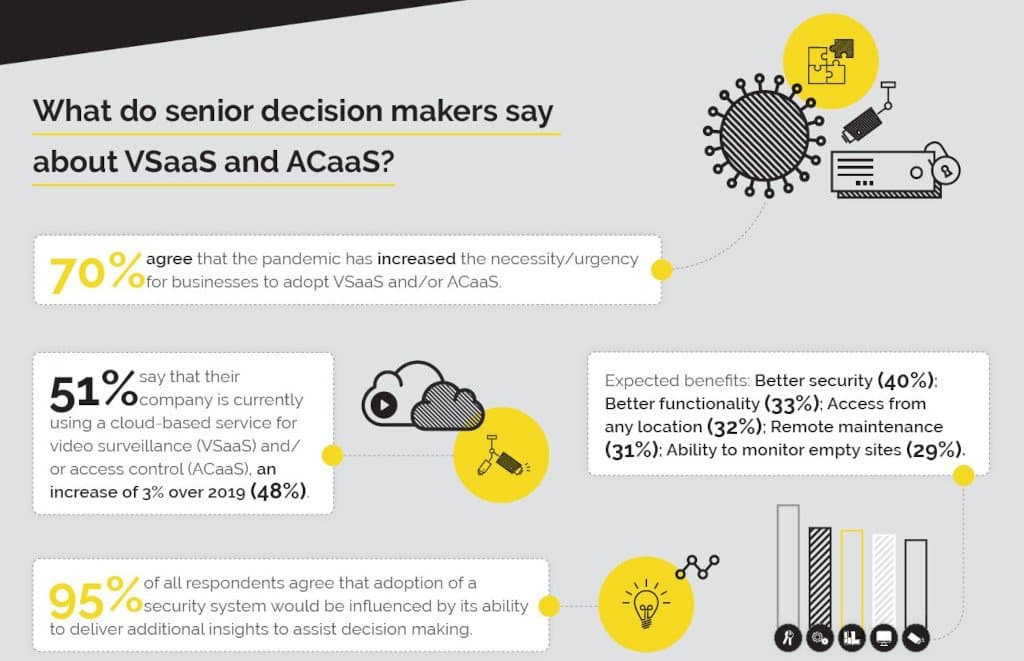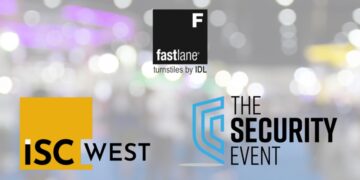There has been a sharp increase in the necessity for businesses to adopt hosted video surveillance (VSaaS) and access control (ACaaS) solutions according to new research into the impact of Covid-19 on physical security purchasing decisions. While 70% of 1,000 senior decision makers in IT, security, FM and HR roles agree this to be the case, 78% also anticipate their organisations’ use of cloud technologies to increase in the future as a result of Covid-19.
Morphean commissioned the independent survey which revealed that over three-quarters (76%) of senior managers in UK, Germany and Sweden have increased their use of video conferencing (e.g. Microsoft Teams); 65% have increased their use of office applications (e.g. Microsoft 365); and 70% of those in the security sector are now strongly inclined towards cloud adoption.
51% say their company is currently using a cloud-based service for video surveillance (VSaaS) and/or access control (ACaaS). This is an increase of 3% over 2019 (48%) and broadly reflects projected growth in the physical security market from US$93.5 billion in 2020 to US$120.3 billion by 2025 at a CAGR of 5.2%. The accelerating adoption of hosted solutions is buoyed by its low cost set up, flexible scalability and demand for real-time and remote access to security data.
“The results highlight a hosted physical security market that will see strong growth in 2021 as cloud applications are proven to deliver business continuity in challenging times,” said Rodrigue Zbinden, CEO of Morphean SA. “At the height of the lockdown, many business premises were unoccupied and potentially vulnerable, but remote monitoring and maintenance made possible by hosted security were a welcome advantage. We also saw a spike in demand for frictionless access control enabling a totally hands-free experience and negating the need for physical contact. Business leaders will now be considering the learnings from the past year and looking to apply them to boost productivity, streamline costs and make organisations more agile.”
For security professionals already working with cloud services, the growth in connected digital devices through the IoT is resulting in an increased appetite for physical security, such as network cameras, to enhance existing IT systems and assist business intelligence gathering. The report shows that 95% agree that if an existing security system could deliver insights beyond security to assist decision making (i.e. occupancy or test and trace analytics), it would influence adoption.
More flexibility in working locations is the benefit respondents are most likely to identify from moving business functions to the cloud (50%), followed by easier collaboration (44%); more cost-effective (44%); safer/better security (38%). It was found that 82% anticipate the levels/frequency of remote workers and flexible working in their organisations to be higher post-pandemic and in the longer term than they were pre-pandemic.
Security will need to be enhanced to facilitate greater flexibility in worker patterns. An access control solution which is linked to HR records, for example, can check the swipe of an access card against staff records. A staff member who is flagged as being on leave, absent or no longer employed will trigger an automated alert to the relevant personnel. Surveillance cameras also provide secondary authentication through visual clarification of an individual’s identity.
“For the physical security reseller, the study will demonstrate that hosted security solutions must play a major part in expanding their offering to a wiser customer base,” said Zbinden. “Cloud-enabled physical security solutions represent an investment into improving security and operations, a chance to forge new business relationships, and an opportunity to embrace future proof technologies in preparation for whatever challenges the future might hold.”
Read the full report here.






